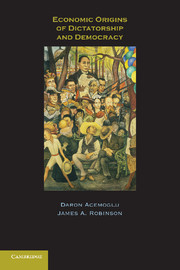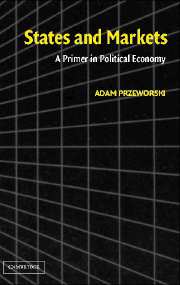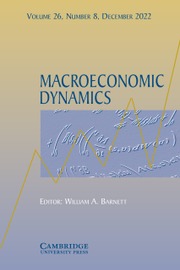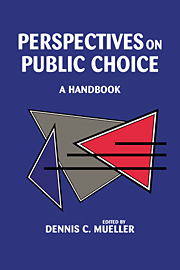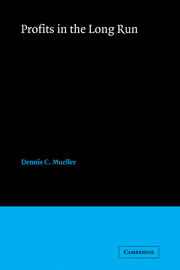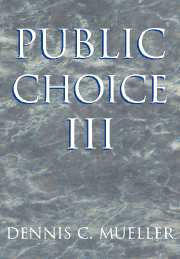
Public Choice III
3rd Edition
- Author: Dennis C. Mueller, Universität Wien, Austria
- Date Published: February 2003
- availability: Available
- format: Paperback
- isbn: 9780521894753
Paperback
-
This book represents a considerable revision and expansion of Public Choice II (1989). As in the previous editions, all of the major topics of public choice are covered. These include: why the state exists, voting rules, federalism, the theory of clubs, two-party and multiparty electoral systems, rent seeking, bureaucracy, interest groups, dictatorship, the size of government, voter participation, and political business cycles. Normative issues in public choice are also examined. The book is suitable for upper level courses in economics dealing with politics, and political science courses emphasizing rational actor models.
Read more- Latest edition of one of top 10 selling titles on economics list
- Contains 6 new chapters, others substantively revised
- Covers all public choice literature, theory, and applied work, in economics and politics
Reviews & endorsements
"No student or teacher of public choice and no researcher working at the intersection of economics and politics can afford to not have a copy of Public Choice III within easy reach. Public Choice
Customer reviews
Not yet reviewed
Be the first to review
Review was not posted due to profanity
×Product details
- Edition: 3rd Edition
- Date Published: February 2003
- format: Paperback
- isbn: 9780521894753
- length: 790 pages
- dimensions: 251 x 178 x 43 mm
- weight: 1.343kg
- contains: 120 b/w illus. 75 tables
- availability: Available
Table of Contents
1. Introduction
Part I. Origins of the State:
2. The reason for collective choice - allocative efficiency
3. The reason for collective choice - redistribution
Part II. Public Choice in a Direct Democracy:
4. The choice of voting rule
5. Majority rule - positive properties
6. Majority rule - normative properties
7. Simple alternatives to majority rule
8. Complicated alternatives to majority rule
9. Exit, voice and disloyalty
Part III. Public Choice in a Representative Democracy:
10. Federalism
11. Two-party competition - deterministic voting
12. Two-party competition - probabilistic voting
13. Multiparty systems
14. The paradox of voting
15. Rent seeking
16. Bureaucracy
17. Legislatures and bureaucracies
18. Dictatorship
Part IV. Applications and Testing:
19. Political competition and macroeconomic performance
20. Interest groups, campaign contributions and lobbying
21. The size of government
22. Government size and economic performance
Part V. Normative public choice:
23. Social welfare functions
24. The impossibility of a social ordering
25. A just social contract
26. The constitution as a utilitarian contract
27. Liberal rights and social choices
Part VI. What Have We Learned?:
28. Has public choice contributed anything to the study of politics?
29. Allocation, redistribution, and public choice.Instructors have used or reviewed this title for the following courses
- Adv Topics: Pol. Economy I
- Causality and Experimentation in Social Sciences
- Economic Analysis of Politics
- Graduate Public Economics I
- Intro to Political Economy
- Political Economy I
- Public Economics ll
- U.S. Economic Politics
Sorry, this resource is locked
Please register or sign in to request access. If you are having problems accessing these resources please email [email protected]
Register Sign in» Proceed
You are now leaving the Cambridge University Press website. Your eBook purchase and download will be completed by our partner www.ebooks.com. Please see the permission section of the www.ebooks.com catalogue page for details of the print & copy limits on our eBooks.
Continue ×Are you sure you want to delete your account?
This cannot be undone.
Thank you for your feedback which will help us improve our service.
If you requested a response, we will make sure to get back to you shortly.
×
